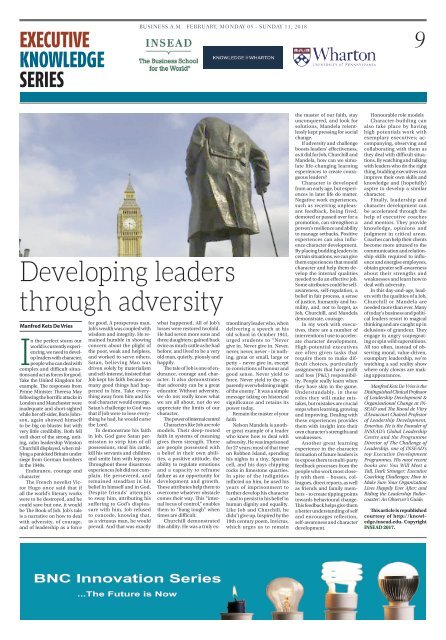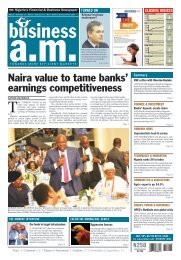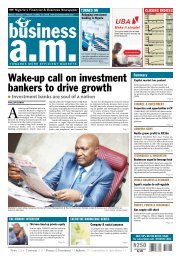You also want an ePaper? Increase the reach of your titles
YUMPU automatically turns print PDFs into web optimized ePapers that Google loves.
EXECUTIVE<br />
KNOWLEDGE<br />
SERIES<br />
BUSINESS A.M. FEBRUARY, MONDAY <strong>05</strong> - SUNDAY 11, 20<strong>18</strong><br />
9<br />
Developing leaders<br />
through adversity<br />
Manfred Kets De Vries<br />
In the perfect storm our<br />
world is currently experiencing,<br />
we need to develop<br />
leaders with character,<br />
people who can deal with<br />
complex and difficult situations<br />
and act as forces for good.<br />
Take the United Kingdom for<br />
example. The responses from<br />
Prime Minister Theresa May<br />
following the horrific attacks in<br />
London and Manchester were<br />
inadequate and short-sighted<br />
while her off-sider, Boris Johnson,<br />
again showed himself<br />
to be big on bluster but with<br />
very little credibility. Both fell<br />
well short of the strong, uniting,<br />
calm leadership Winston<br />
Churchill displayed, when rallying<br />
a panicked Britain under<br />
siege from German bombers<br />
in the 1940s.<br />
Endurance, courage and<br />
character<br />
The French novelist Victor<br />
Hugo once said that if<br />
all the world’s literary works<br />
were to be destroyed, and he<br />
could save but one, it would<br />
be The Book of Job. Job’s tale<br />
is a narrative on how to deal<br />
with adversity, of courage,<br />
and of leadership as a force<br />
for good. A prosperous man,<br />
Job’s wealth was coupled with<br />
wisdom and integrity. He remained<br />
humble in showing<br />
concern about the plight of<br />
the poor, weak and helpless,<br />
and worked to serve others.<br />
Satan, believing Man was<br />
driven solely by materialism<br />
and self-interest, insisted that<br />
Job kept his faith because so<br />
many good things had happened<br />
to him. Take everything<br />
away from him and his<br />
real character would emerge.<br />
Satan’s challenge to God was<br />
that if Job were to lose everything<br />
he had, he would curse<br />
the Lord.<br />
To demonstrate his faith<br />
in Job, God gave Satan permission<br />
to strip him of all<br />
possessions, steal his cattle,<br />
kill his servants and children<br />
and smite him with leprosy.<br />
Throughout these disastrous<br />
experiences Job did not complain.<br />
He persevered, and<br />
remained steadfast in his<br />
belief in himself and in God.<br />
Despite friends’ attempts<br />
to sway him, attributing his<br />
suffering to God’s displeasure<br />
with him, Job refused<br />
to concede, knowing that,<br />
as a virtuous man, he would<br />
prevail. And that was exactly<br />
what happened. All of Job’s<br />
losses were restored twofold.<br />
He had seven more sons and<br />
three daughters; gained back<br />
twice as much cattle as he had<br />
before; and lived to be a very<br />
old man, quietly, piously and<br />
happily.<br />
The tale of Job is one of endurance,<br />
courage and character.<br />
It also demonstrates<br />
that adversity can be a great<br />
educator. Without adversity,<br />
we do not really know what<br />
we are all about, nor do we<br />
appreciate the limits of our<br />
character.<br />
The power of internal control<br />
Characters like Job are role<br />
models. Their deep-rooted<br />
faith in systems of meaning<br />
gives them strength. There<br />
are people possessed with<br />
a belief in their own abilities,<br />
a positive attitude, the<br />
ability to regulate emotions<br />
and a capacity to reframe<br />
failure as an opportunity for<br />
development and growth.<br />
These attributes help them to<br />
overcome whatever obstacle<br />
comes their way. This “internal<br />
locus of control,” enables<br />
them to “hang tough” when<br />
times are difficult.<br />
Churchill demonstrated<br />
this ability. He was a truly extraordinary<br />
leader who, when<br />
delivering a speech at his<br />
old school in October 1941,<br />
urged students to “Never<br />
give in. Never give in. Never,<br />
never, never, never – in nothing,<br />
great or small, large or<br />
petty – never give in, except<br />
to convictions of honour and<br />
good sense. Never yield to<br />
force. Never yield to the apparently<br />
overwhelming might<br />
of the enemy.” It was a simple<br />
message taking on historical<br />
significance and retains its<br />
power today.<br />
Remain the master of your<br />
faith<br />
Nelson Mandela is another<br />
great example of a leader<br />
who knew how to deal with<br />
adversity. He was imprisoned<br />
for 27 years; most of that time<br />
on Robben Island, spending<br />
his nights in a tiny, Spartan<br />
cell, and his days chipping<br />
rocks in limestone quarries.<br />
In spite of the indignities<br />
inflicted on him, he used his<br />
years of imprisonment to<br />
further develop his character<br />
– and to persist in his belief in<br />
human dignity and equality.<br />
Like Job and Churchill, he<br />
didn’t give up. Inspired by the<br />
19th century poem, Invictus,<br />
which urges us to remain<br />
the master of our faith, stay<br />
unconquered, and look for<br />
solutions, Mandela relentlessly<br />
kept pressing for social<br />
change.<br />
If adversity and challenge<br />
boosts leaders’ effectiveness,<br />
as it did for Job, Churchill and<br />
Mandela, how can we simulate<br />
life-changing learning<br />
experiences to create courageous<br />
leaders?<br />
Character is developed<br />
from an early age, but experiences<br />
in later life do matter.<br />
Negative work experiences,<br />
such as receiving unpleasant<br />
feedback, being fired,<br />
demoted or passed over for a<br />
promotion, can strengthen a<br />
person’s resilience and ability<br />
to manage setbacks. Positive<br />
experiences can also influence<br />
character development.<br />
By placing budding leaders in<br />
certain situations, we can give<br />
them experiences that mould<br />
character and help them develop<br />
the internal qualities<br />
needed to do an effective job.<br />
Some attributes could be selfawareness,<br />
self-regulation, a<br />
belief in fair process, a sense<br />
of justice, humanity and humility,<br />
and, not to forget, as<br />
Job, Churchill, and Mandela<br />
demonstrate, courage.<br />
In my work with executives,<br />
there are a number of<br />
interventions I use to accelerate<br />
character development.<br />
High-potential executives<br />
are often given tasks that<br />
require them to make difficult<br />
choices, particularly<br />
assignments that have profit<br />
and loss (P&L) responsibility.<br />
People really learn when<br />
they have skin in the game.<br />
Understandably, in these<br />
roles they will make mistakes,<br />
but mistakes are crucial<br />
steps when learning, growing<br />
and improving. Dealing with<br />
these experiences provides<br />
them with insight into their<br />
own character’s strengths and<br />
weaknesses.<br />
Another great learning<br />
experience in the character<br />
formation of future leaders is<br />
to expose them to multi-party<br />
feedback processes from the<br />
people who work most closely<br />
with them – bosses, colleagues,<br />
direct reports, as well<br />
as friends and family members<br />
– to create tipping points<br />
towards behavioural change.<br />
This feedback helps give them<br />
a better understanding of self<br />
and encourages reflection,<br />
self-awareness and character<br />
development.<br />
Honourable role models<br />
Character-building can<br />
also take place by having<br />
high potentials work with<br />
exemplary executives; accompanying,<br />
observing and<br />
collaborating with them as<br />
they deal with difficult situations.<br />
By watching and talking<br />
with leaders who do the right<br />
thing, budding executives can<br />
improve their own skills and<br />
knowledge and (hopefully)<br />
aspire to develop a similar<br />
character.<br />
Finally, leadership and<br />
character development can<br />
be accelerated through the<br />
help of executive coaches<br />
and mentors. They provide<br />
knowledge, opinions and<br />
judgment in critical areas.<br />
Coaches can help their clients<br />
become more attuned to the<br />
communication and relationship<br />
skills required to influence<br />
and energise employees,<br />
obtain greater self-awareness<br />
about their strengths and<br />
weaknesses and learn how to<br />
deal with adversity.<br />
In this day-and-age, leaders<br />
with the qualities of a Job,<br />
Churchill or Mandela are<br />
needed more than ever. Many<br />
of today’s business and political<br />
leaders resort to magical<br />
thinking and are caught up in<br />
delusions of grandeur. They<br />
engage in angry scapegoating<br />
or spin wild superstitions.<br />
All too often, instead of observing<br />
moral, value-driven,<br />
exemplary leadership, we’re<br />
watching a sad reality show<br />
where only clowns are making<br />
appearances.<br />
Manfred Kets De Vries is the<br />
Distinguished Clinical Professor<br />
of Leadership Development &<br />
Organisational Change at IN-<br />
SEAD and The Raoul de Vitry<br />
d’Avaucourt Chaired Professor<br />
of Leadership Development,<br />
Emeritus. He is the Founder of<br />
INSEAD’s Global Leadership<br />
Centre and the Programme<br />
Director of The Challenge of<br />
Leadership, one of INSEAD’s<br />
top Executive Development<br />
Programmes. His most recent<br />
books are: You Will Meet a<br />
Tall, Dark Stranger: Executive<br />
Coaching Challenges; How to<br />
Make Sure Your Organization<br />
Lives Happily Ever After; and<br />
Riding the Leadership Rollercoaster:<br />
An Observer’s Guide.<br />
This article is republished<br />
courtesy of http://knowledge.insead.edu.<br />
Copyright<br />
INSEAD 2017.<br />
BNC Innovation Series<br />
...The Future is Now










